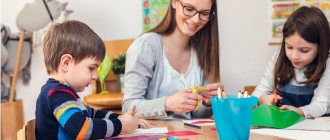Comprehensive thematic planning of educational activities in preschool educational institutions
Bibliographic description:
Amaeva, N. I. Comprehensive thematic planning of educational activities in preschool educational institutions / N. I. Amaeva. — Text: direct // Pedagogical skills: materials of the V International. scientific conf. (Moscow, November 2014). - Moscow: Buki-Vedi, 2014. - pp. 131-132. — URL: https://moluch.ru/conf/ped/archive/144/6437/ (access date: 12/19/2021).
In the article, the authors talk about changes in the education system of Kazakhstan as an inevitable process that reflects new demands and needs of society.
Key words: criterion-based assessment, education system, creativity, personality, learning outcomes, geography.
Our world does not stand still. It is a dynamic system that is constantly developing and undergoing changes. They affected all spheres of human life, in particular, education. The growth of the intellectual potential of society, a large flow of information that requires people to have the skills to process and perceive it, as well as a change in consciousness in favor of the use of increasingly sophisticated technologies have contributed to the need to modernize the education system. The traditional type of assessment and lesson delivery is becoming obsolete. It is being replaced by a new format, which is characterized by the independence of students in finding solutions to problems and tasks, initiative in the learning process, and the introduction of research activities. In this format, a creative approach is encouraged, which allows children to open up, develop comprehensively, and show their creativity and originality.
Modern approaches in education radically change the activities and roles of such subjects as “teacher” and “student”. The milestone of change did not leave Kazakhstan aside.
The teacher is called upon to perform miracles; his students expect them from him, and this happens if he simulates the conditions under which the child’s personality receives the greatest development. Now the teacher is not a source of information. He guides and creates all kinds of conditions for the development of a competitive personality. The student must constantly, every day, make small discoveries for himself. This is an effective and creative approach to learning. [1, p. 122] And research, as we know, is a creative process, creativity cannot be imposed from the outside, it is born on the basis of an internal need, namely, the need for knowledge. [2, p. 27, 29]
It is worth noting such a concept as human capital. It is especially relevant now and means knowledge, abilities and skills that are accumulated into a single set and determine the resourcefulness and ingenuity of an individual in decision making. Every day we observe rapid transformations in the educational environment, which are becoming increasingly noticeable. This process changed not only its structure, but also its perception of reality. Now, instead of accepting information without questioning and being inactive in learning, a model of education is applied through the ability to ask questions and the ability to adapt to new life situations. The use of technical means in the educational process helps the development of a new personality, where its main goal is to improve the quality of one’s knowledge within a short period of time. Technological advances have made their contribution to this difficult issue. With their help, it is difficult to imagine the assessment process, especially in distance learning conditions. The modern view of educational content shows that teachers who can keep up with technological and methodological developments in their field are seen as innovative teachers. These are those who integrate technology into their studies, where Internet resources are the most important application form in the study of innovation.
Educational results have both personal and professionally oriented components. Therefore, assessment has a multilateral specificity, which takes into account national interests, psychological and pedagogical aspects, personal orientations and polytypical beliefs. All of the above forms the basis of a comprehensive assessment that describes qualitative and quantitative criteria for the student’s achievements and activities. It should be emphasized that the skill of assessment comes to each of us from an early age. It is built in constant cognition, in everyday actions and the ability to learn. In this context, it is necessary to highlight the creative orientation that goes alongside logical thinking. In the school education system, it is important to rely on students’ existing knowledge, which determines the nature of the decisions made. The classical approach to assessment has emerged relatively recently, but it has many shortcomings. It only involves the reproduction of the material received in the lesson, where the quality of the information presented is assessed. This approach has become obsolete and is less effective at the moment. Instead, such assessment as criterion-based assessment appears.
A large and constant part of the teacher’s creative process is carried out in public, in an environment of public activity.
One of the main goals of updated educational content is to make the learning process fun and entertaining, which will inspire students to search for new information. It is also worth noting the following equally important goals, implemented in the process of training and educating a versatile person of the new generation:
- Improving the quality of the educational process, including the knowledge gained in the lessons, which will help students in the future become a creative, competitive and open person;
- Improving the educational activities of students and the form of assessment in the context of updating the educational program;
- “Mangilik El” in geography lessons (and other academic subjects)
No less important are the following aspects, such as building the content of educational lessons that ensure the formation of patriotic feelings and spiritual and moral qualities, civic responsibility of students, the development of their national self-awareness and tolerance, strengthening secular values and the formation of conscious rejection by young people of the idea of terrorism and extremism, the ability to communicate in conditions multi-ethnic Kazakhstan. [3]
Quite often the concept of “criteria-based assessment” is heard. But do we think about the goals and the process as a whole? One of the goals can be identified: determining and increasing the educational activities of students.
The criterion is a measuring unit in this concept. Transparency, openness and honesty of assessment directly depend on their choice. Let's consider each component in the context of an assignment in geography lessons. Students were asked to solve a population problem. Many of them wrote down only the answer without indicating the solution. Accordingly, the work of the student where the formula used and the solution steps are indicated will be more advantageous.
There have been studies in many countries around the world that have examined the effects of assessment criteria (performance-based or competency-based), relevance (the appropriateness and validity of criteria compared to others), and their interaction on academic performance. The results show that students who were given specific criteria received more accurate and truthful assessments of their performance, performed better on differentiated tasks, and achieved higher learning efficiency (defined as the ratio between performance and mental effort) compared to those who were given all criteria. Students who were given performance-based assessment criteria invested less mental effort into the assessment, resulting in improved learning efficiency. The interaction effect for response specificity indicates that the combination of performance-based and matching criteria results in higher-quality analyzes of worked examples compared to other criterion combinations. [4, p. 971]
The study of geography for an individual begins with the relationship between a person and a location. They develop based on the acquisition of specific skills necessary to understand and make the most of a geographic location. One of the main goals of studying geography in high school is to enable students to acquire skills that will improve their spatial awareness. Accordingly, a geography curriculum is under active development, the core elements of which are the skills, concepts, values and attitudes developed since 2000.
Studying economic processes through the lens of human-geographic relationships is effective in promoting environmental conservation and developing the geographic skills of individuals.
In today's philosophy of education and structuring of knowledge, one of the basic elements that must be acquired by students has been adopted due to the need for a new approach to education. In this context, it is important to acquire practical skills in the implementation of all educational programs. The geography teaching curriculum adopts a skills-based structure. [5, p. 2166]
Problem setting plays a key role in geography lessons as it allows students to become familiar with the content of the subject, orients lessons towards pre-determined learning outcomes and is therefore important for assessment. At the same time, the use of tasks is complex, since it is necessary to take into account numerous aspects relating to the content of the subject and the individual characteristics of students.
Based on theoretical and empirical foundations, seven quality criteria can be identified for tasks in the field of geographical education:
- Motivating and engaging students;
- Taking student heterogeneity into account;
- Structuring the learning process;
- Clear formulation of goals and objectives;
- Consideration of individual and social learning processes;
- Constructive use of materials;
- Promoting the development of specialist knowledge in specific subjects.
These criteria were found valuable for preparing, observing and thinking about problems in geography lessons, which has recently been considered a very comprehensive field of study. [6, p. 1]
Literature:
1 PEDAGOGICAL IZDENIS Akparattyk gylymi-adistemelik journal / PEDAGOGICAL SEARCH Information scientific and methodological journal / No. 4 (27) zheltoksan / December 2017 / “ORLEU” BAKO” AK BRANCHES “SKO PK BAI” / E .Sidorova. Conform! This means - take action!
2 Khmel N.D. Theory and technology of implementing a holistic pedagogical process / Textbook (To help teachers, graduate students, undergraduates, students) - Almaty, 2001.
3 https://bilimvko.gov.kz/ru/mangilik-el National idea “Mangilik El”
4 Fastré, Greet MJ; van der Klink, Marcel R.; Amsing-Smith, Pauline; van Merriënboer, Jeroen J. Assessment Criteria for Competency-Based Education: A Study in Nursing Education / Instructional Science: An International Journal of the Learning Sciences, 2014. Article link: https://eric.ed.gov/?q= Criteria+assessment&id=EJ1042882
5 Unlu Mehmet. The Level of Realizing Geographical Skills in Geography Lessons / Educational Sciences: Theory and Practice, 2011. Link to article: https://eric.ed.gov/?q=Unlu+Mehmet&id=EJ962693
6 Uwe Krause, Alexandra Budke and Veit Maier. Understanding of Developing and Setting Tasks in Geography Lessons by German and Dutch Student Teachers / Education Sciences, 2021. Link to article: https://eric.ed.gov/?q=Criteria+assessment+in+geography+lessons&id=EJ1288518
Key terms
(automatically generated)
: educational process, comprehensive thematic plan, kindergarten, preschool education, preschool age, week, planning system.
Explanatory note
The subsequent development of his personality and the success of his subsequent socialization depend on how well a child’s speech is developed. In the age of computer technology and innovative achievements, new communication options are emerging. Despite the rapid growth of science, more and more preschool children have speech problems. If the situation does not change, society faces a real linguistic catastrophe. Parents spend less and less time with their children; instead of meaningful communication, they buy them modern gadgets. In order to solve the problem, it is necessary to develop speech skills in children. Of course, not only teachers, but also parents and psychologists must create favorable conditions for the harmonious formation of the child’s personality. Statistics confirm a direct connection between developed speech skills and a child’s success in school, family life, and in a professional environment.
Areas of work
Taking into account the requirements of the new federal educational standards, special attention is paid to the following areas in planning:
- physical development;
- health of preschool children;
- socialization through gaming activities;
- security;
- communication skills;
- cognition;
- reading;
- artistic creativity.
In promoting the health of preschoolers, emphasis is placed on the ability to dress independently for a walk. In social and personal development, special attention is paid to dialogue communication between the teacher and the child.
Taking into account the individual characteristics of preschool children
At the age of three or four years, the baby tries to go beyond the family social circle. In the eyes of a child, an adult looks not only as a member of the family, but also as a representative of society. The baby tries to imitate his parents, as a result of which a contradiction arises between his desires and real possibilities. In order to eliminate this problem, play activities are actively used in preschool age. It involves transferring actions to toys, which are substitute objects. Younger preschoolers play no more than two roles in such a game; its plot should be clear and undeveloped. At this age, the formation of gaming skills is just beginning, which is why it is so important to acquaint children with its rules and features.


